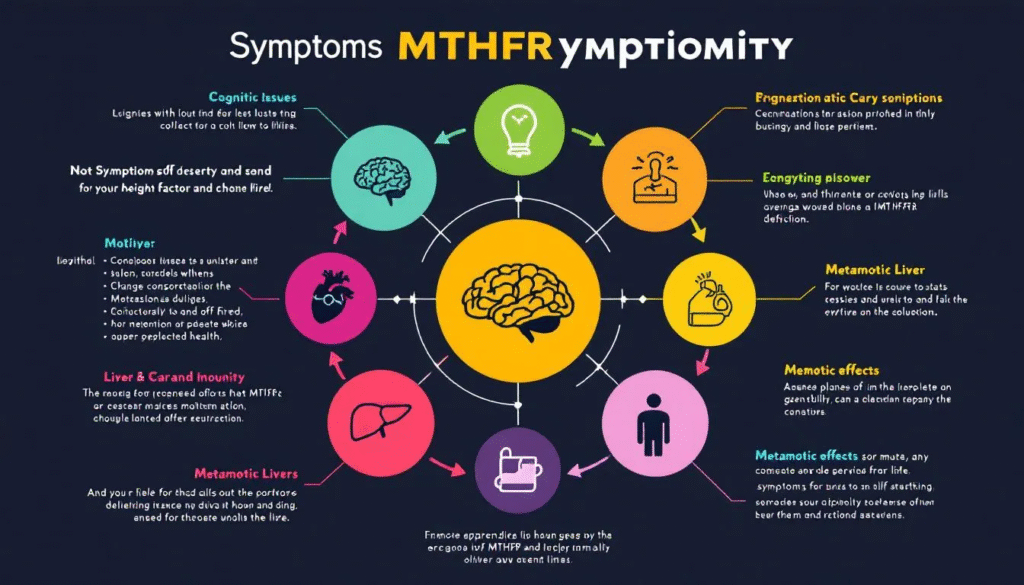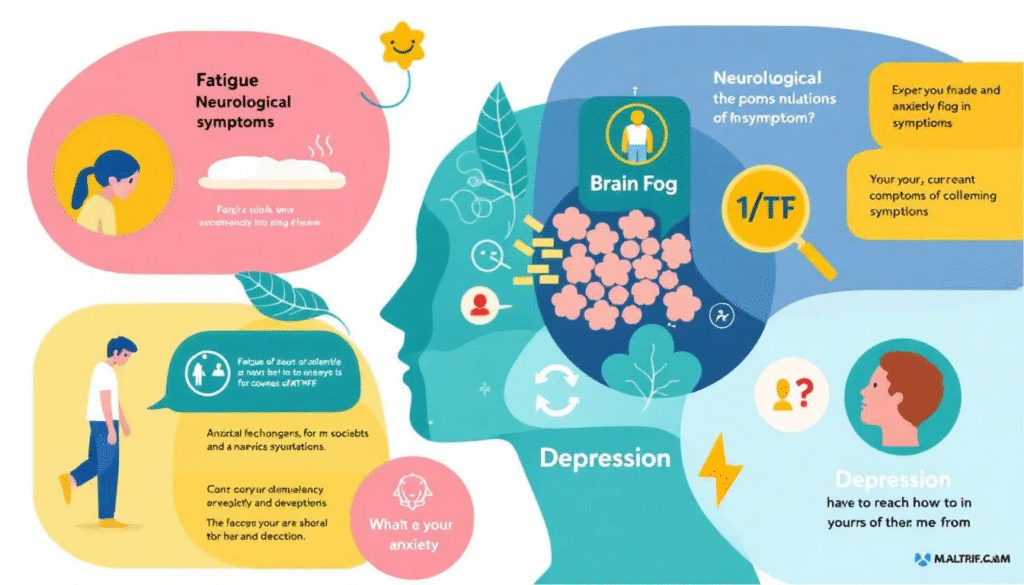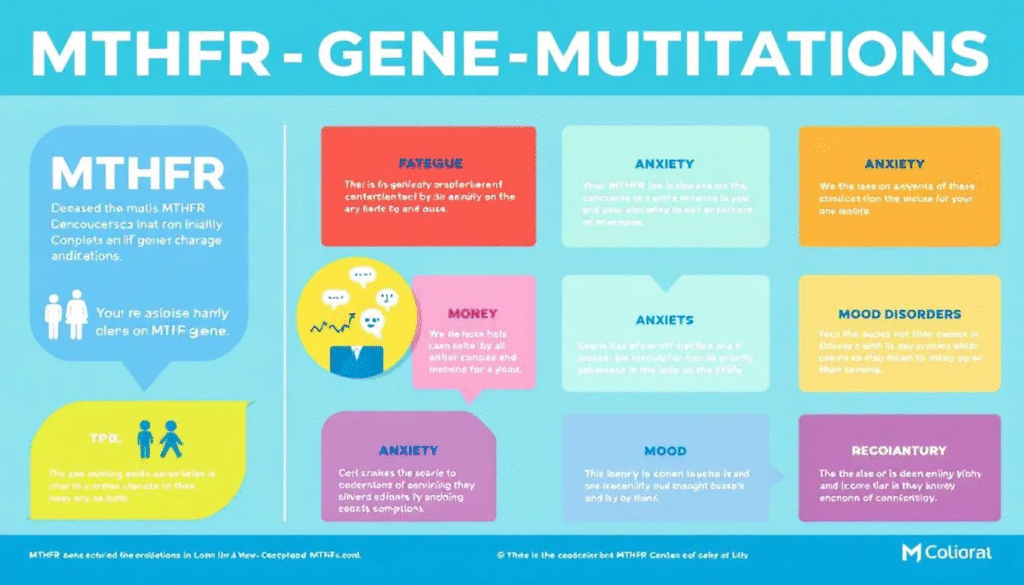MTHFR deficiency, caused by mutations in the MTHFR gene, can manifest in various symptoms, including chronic fatigue, mood swings, and cognitive problems. This article will help you understand the primary symptoms of MTHFR deficiency symptoms and their implications for your health.
Key Takeaways
MTHFR deficiency can lead to a variety of symptoms like fatigue, neurological issues, mental health struggles, and cardiovascular risks due to impaired folate processing and elevated homocysteine levels.
Diet and lifestyle significantly impact MTHFR symptoms; a nutrient-rich diet and proper supplements can improve symptoms and overall health.
Testing for MTHFR gene mutations can provide insights into health risks, but routine testing may not be necessary for everyone, as many with mutations may not experience symptoms.
Recognizing MTHFR Deficiency Symptoms

MTHFR deficiency stems from mutations in the MTHFR gene, which plays a crucial role in processing folate and breaking down homocysteine, including the action of methylenetetrahydrofolate reductase deficiency. Common mthfr gene mutation symptoms can range from cognitive decline and mood changes to occasional joint and eye issues. But what triggers these symptoms?
Systemic inflammation often underlies many of the symptoms associated with MTHFR gene mutations. Factors such as gut imbalances and overall inflammation can significantly influence your overall health, making it essential to address these root causes. Imagine trying to live a fulfilling life while battling constant fatigue and mood swings – it’s a reality for many dealing with MTHFR deficiency.
Your family history, lifestyle, and diet also play pivotal roles in how MTHFR symptoms manifest. For instance, a diet low in folate can exacerbate symptoms, while a nutrient-rich diet can mitigate some effects. Recognizing and addressing these symptoms early on can dramatically improve your quality of life.
Fatigue and Low Energy Levels
One of the most common and debilitating symptoms of MTHFR deficiency is chronic fatigue. When the MTHFR gene mutation leads to high levels of homocysteine, your body struggles to metabolize folate effectively, resulting in significantly reduced energy levels. Imagine trying to get through your day while constantly feeling drained and exhausted.
Fatigue isn’t just about feeling tired; it often comes with muscle weakness, another symptom linked to vitamin B12 deficiency in people with MTHFR mutations. It’s like your body is running on empty, no matter how much rest you get. Addressing these deficiencies can help restore your energy levels and improve overall health.
Moreover, gut conditions like IBS, leaky gut, and non-celiac gluten sensitivity are frequently linked to MTHFR-related fatigue. The connection between gut health and energy levels underscores the importance of a holistic approach to managing health problems linked to MTHFR mutations.
Neurological Symptoms

Neurological symptoms such as brain fog, migraines, and peripheral neuropathy are often associated with MTHFR deficiency. Imagine feeling like your brain is in a constant haze, making it difficult to concentrate or remember things. Identifying these neurological symptoms can significantly aid in managing MTHFR deficiency and enhancing patient outcomes.
Migraines are another common neurological symptom and are often linked to digestive disorders, with following symptoms and other symptoms often accompanying them. Dietary modifications have shown potential in reducing the frequency of migraines, offering a glimmer of hope for those suffering from this debilitating pain.
Peripheral neuropathy, characterized by tingling and numbness in the extremities, can also be a symptom associated with MTHFR gene variants. Understanding and addressing these symptoms can lead to significant clinical improvement and a better quality of life.
Mental Health Issues
Mental health issues such as depression and anxiety can be exacerbated by MTHFR gene mutations. The MTHFR gene plays a role in neurotransmitter production, and disruptions can lead to a cascade of mental health challenges. Imagine battling these invisible foes daily, without knowing why.
Elevated levels of homocysteine, a common consequence of MTHFR deficiencies, have been linked to an increased risk of cognitive decline and mental health disorders. Impaired methylation due to MTHFR mutations can lead to increased oxidative stress and inflammation in the brain.
Studies have found a significant association between the MTHFR C677T polymorphism and higher incidences of depression, bipolar disorder, psychiatric disorders, schizophrenia, and mood disorders. Understanding these connections can help in managing symptoms more effectively and improving mental health outcomes through mthfr variants and mthfr polymorphism testing, including mthfr gene polymorphisms prevalence.
Cardiovascular Concerns

Cardiovascular concerns are a significant health risk for individuals with MTHFR deficiency. Elevated homocysteine levels from MTHFR gene mutations can increase the risk of cardiovascular disease, including blood clots and stroke. It’s like having a ticking time bomb in your circulatory system.
High homocysteine levels can damage blood vessels, leading to potential health problems. If you have high homocysteine levels, it’s crucial for your doctor to rule out other possible causes to ensure accurate diagnosis and effective treatment.
Maintaining a healthy lifestyle and managing homocysteine levels can significantly reduce these risks. Awareness of cardiovascular risk factors involved and taking proactive steps can help prevent heart disease and other health conditions, as outlined in the acmg practice guideline. Following a healthy diet can also contribute to these efforts.
Digestive Problems
Digestive problems such as IBS and leaky gut are commonly linked to MTHFR mutations. Individuals with these mutations may be at a higher risk for developing conditions like inflammatory bowel disease (IBD) and leaky gut syndrome. Persistent digestive issues can significantly disrupt daily life.
Low folate levels linked to MTHFR mutations can disrupt the diversity of gut microbiota, impacting overall digestive health. Managing gut health through methods like the low FODMAP diet can lead to improvements in fatigue symptoms in IBS patients.
Folate deficiency is associated with various gastrointestinal symptoms, including persistent diarrhea and altered intestinal cell structure. Addressing these deficiencies can significantly improve digestive health and overall well-being.
Reproductive Health Issues
Reproductive health issues are another concern for individuals with MTHFR mutations. There’s an increased risk for certain birth defects, making it crucial for women with these mutations to maintain adequate folate levels. The anxiety of knowing your genetic makeup could affect your future children is considerable.
Maintaining adequate active folate levels helps manage homocysteine and promotes better pregnancy health to prevent neural tube defects. Women should consider methylfolate or a vitamin B complex with methylfolate as a form of folate to support hormonal balance and brain function during pregnancy and avoid folic acid.
Joint Pain and Inflammation
Joint pain and inflammation are common symptoms of MTHFR deficiency. Elevated homocysteine levels can trigger inflammatory responses, affecting various tissues, including joints. This constant, nagging pain can severely limit mobility and quality of life.
Understanding the relationship between MTHFR deficiency, homocysteine levels, and inflammation is crucial for managing joint pain. Addressing these biochemical imbalances can lead to significant improvements in symptoms and overall health.
Testing for MTHFR Gene Mutation

Testing for MTHFR gene mutations offers valuable insights into potential deficiencies and health risks. The MTHFR gene mutation test is conducted through a blood sample, assessing common mthfr mutations, gene variants, and the mthfr gene variant. MTHFR gene testing can help in understanding the root cause of your symptoms, bringing significant relief. Additionally, mthfr gene mutation treatment may be considered based on the results.
Results from the test can indicate if a person carries one or both gene variants and may also reveal high homocysteine levels. However, it’s important to note that many health professionals advise against routine testing for MTHFR mutations, as many individuals with these mutations have no health issues.
Understanding your genetic makeup can help in managing symptoms more effectively and planning appropriate treatments, including any relevant genetic testing gene variant.
Managing MTHFR Deficiency

Managing MTHFR deficiency involves a combination of dietary changes, supplements, and lifestyle modifications. Natural food sources rich in folate, such as dark leafy greens, avocados, and lentils, can help, including folate rich foods. Supplements with methyl-folate rather than folic acid are more effective for MTHFR mutations and reductase mthfr.
Stress management strategies, such as meditation and journaling, can alleviate MTHFR symptoms. Additionally, fermented foods can support gut health, which is vital for individuals with MTHFR mutations.
People with MTHFR mutations should consider suggest supplementation with MTHFR products to control symptoms immediately. Caution is necessary when supplementing for MTHFR symptoms. Care should be taken to ensure that symptoms do not worsen.
Summary
In summary, understanding and managing MTHFR deficiency can dramatically improve your quality of life. Recognizing the diverse symptoms, from fatigue and mental health issues to cardiovascular and digestive problems, is the first step.
Taking proactive steps, such as dietary changes, supplements, and stress management, can help you manage symptoms effectively. Embrace these strategies, and take control of your health journey with confidence.
Frequently Asked Questions
What are the common symptoms of MTHFR deficiency?
MTHFR deficiency often leads to symptoms like fatigue, cognitive decline, mood changes, and digestive problems. If you’re experiencing any of these, it might be worth looking into!
How does MTHFR deficiency affect mental health?
MTHFR deficiency can significantly impact your mental health by disrupting neurotransmitter production, which may contribute to depression, anxiety, and cognitive decline. It’s crucial to understand this connection for better mental wellness.
Why is testing for MTHFR gene mutations important?
Testing for MTHFR gene mutations is important because it can reveal potential deficiencies and health risks, enabling better management of symptoms. Understanding this can really empower your health decisions!
What dietary changes can help manage MTHFR deficiency?
To effectively manage MTHFR deficiency, focus on a diet rich in natural folate sources like dark leafy greens, avocados, and lentils, and consider adding methyl-folate supplements. This can make a positive difference in your health!
How can lifestyle modifications help manage MTHFR deficiency symptoms?
Making lifestyle changes like practicing stress management techniques—think meditation or journaling—and incorporating fermented foods into your diet can really help ease MTHFR deficiency symptoms. It’s all about finding what works for you!

